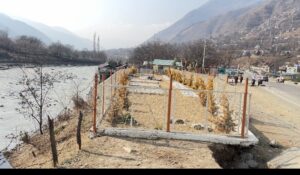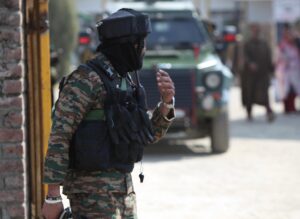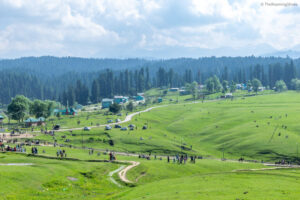A Nostalgic Glimpse Into My Maternal Home

By| Peer Mohammad Amir Qureshi
The gate creaked as I pushed it open, a familiar groan that stirred the air like a sigh from the past. I’d come to the village for milk, a simple errand, but the scene before me was anything but ordinary. The courtyard pulsed with life—children darted across it, their laughter sharp and bright, chasing a cricket ball that kicked up clouds of golden dust. Scooters buzzed like eager bees, weaving through the chaos, their engines humming a song of reckless joy. These kids, eyes alight with the thrill of arrival, had clearly just tumbled into their maternal haven—the nanihaal—a place where the heart feels lighter, where the world feels whole. Watching them, I felt a tug deep in my chest, a thread of memory pulling me back, back to a time when I, too, ran wild under this same sun, my own laughter mingling with the wind.
As a boy, the thought of visiting my maternal home in Babawayil was a fever in my blood. My brothers and I, we’d scheme and squabble, each of us vying for that coveted ticket to paradise. “One at a time,” our parents would say, their voices calm but firm, reining in our restless hearts. When my turn finally came, it was as if spring had bloomed inside me. The journey to Babawayil wasn’t just a trip—it was a pilgrimage to a land of cherries and grandparents’ hugs, where love hung ripe on every branch and laughter spilled like juice from bursting grapes.
The village itself, cradled in the tender embrace of District Ganderbal, was a poem written in green. Babawayil wasn’t just a place; it was a feeling, a heartbeat. Beyond its orchards and whispering woods, it held a quiet rebellion—a dowry-free village, a rare gem in a world often tarnished by greed. Here, marriages were sealed with love, not gold; dignity was a birthright, not a bargain. The people moved with a grace as clear as mountain springs, their lives a testament to an unspoken vow of equality. Babawayil didn’t shout its virtues—it simply lived them, a soft-spoken revolution in a world that often forgets its soul.
The house at the heart of it all was a humble sentinel, a two-storeyed relic that seemed to hold the village’s memories in its weathered walls. At its threshold, a wooden gate, clad in dented tin, rattled in the breeze like an old storyteller clearing its throat. To the right, a cowshed perched slightly higher, where goats bleated their lazy complaints and a cow nuzzled her calf in a bed of straw. Towering walnut trees stood guard, their branches heavy with secrets, leading the way to a sprawling verandahwhere mornings bloomed with the scent of tea and evenings unfurled in stories beneath a star-strewn sky.
To the right of the house, nature had painted a masterpiece—a grapevine curling like poetry over wooden frames, cherry trees blushing crimson in the summer light, and a walnut tree so grand it seemed to bow to the earth in reverence. Its nuts were treasures, smooth-shelled and golden, each one a promise of richness. From the kitchen window, you could see the cherry trees swaying, the grapevines heavy with clusters that gleamed like amethysts. In those long-ago summers, the air thrummed with wings—nightingales and sparrows, a feathered choir that swooped down to feast and sing. Their songs wove a tapestry of joy, but now the branches are silent. The birds have vanished, chased away by the hum of cell towers, the slow choke of progress, the shifting breath of the climate. The stillness they left behind is a wound that aches in the quiet.
I can still see my grandfather, Mohd. Shah—Baba to us, a man whose soul was as steady as the stream he loved (may Almighty Allah grant him Jannah). He was the imam of the mosque, but more than that, he was a beacon of kindness, his life a quiet sermon of compassion. When birds raided the grapevines, my grandmother would huff, “They’re ruining the fruit!” But Baba, with a smile that held the wisdom of ages, would say, “Let them be. They have their right to eat too.” His words were a lesson, not preached but lived, a reminder that generosity is a gift to the world.
Baba had a way of making the ordinary magical. He’d bring us coconut biscuits, cheap little things wrapped in crinkled brown paper, but to us, they were gold. Their crumbly sweetness still lingers on my tongue, a flavor that no gourmet dish could ever rival. My grandmother, too, had her own quiet magic. From her sandook—a wooden chest that creaked with the weight of memory—she’d pull out chocolates and roasted peanuts, each treat wrapped in her love. That sandook was more than storage; it was a keeper of secrets, a vault of childhood.
Kite flying was our religion in Babawayil, a ritual of wind and wonder. I’d tug at my grandmother’s dupatta, begging, “Let me fly one too!” One day, she relented, leading me to her friend Hafeez Aapa’s house. Her son handed me a kite, its vibrant paper trembling with possibility. I carried it home like a sacred relic, my heart soaring before the kite ever did. When it caught the wind, it wasn’t just a toy—it was a dream taking flight, tugging at my hands as if it could pull me into the sky.
Food held no allure in those days. Who could think of meals when the world was full of kites and cousins and endless games? I’d race to Amm Soab’s shop, a tiny haven where the air smelled of biscuits and dreams. A narrow wooden staircase led to it, each creak underfoot a note in the song of my childhood. My cousin Rukhsana Didi, ever my shadow, trailed me under strict orders: “Don’t let him go alone—there are dogs.” The shopkeeper would grin and call out, “Ye Serchuk kar che aamut yoar?”—“When did this one from Serch arrive?” Rukhsana Didi would answer with the patience of a saint, while I dove into the tin boxes, their glass fronts guarding stacks of biscuits like treasures in a chest.
My uncles, all three living under that two-storeyed roof, filled the house with warmth. They’d bicker playfully over who’d host me for dinner, their voices rising with mock indignation: “No, he’s eating with us tonight—I brought chicken!” Their love was a living thing, free of envy, woven with laughter. In the garden they called Daejj, I’d follow them or my aunt, plucking cherries from trees Baba had planted—one for each of his daughters. He’d guide me to the right tree, his voice gentle but firm, teaching me respect even in the act of picking fruit. That garden was a sanctuary, not just for us but for those who sought Baba’s spiritual counsel, his presence a balm to troubled souls.
Evenings were for stories. As the sun dipped low, my grandmother would herd me inside, warning of soldiers or spirits in the dark. In the kitchen, Baba and my uncles would gather, their voices weaving tales of jins and joy, plans and dreams. Those gatherings held a magic that no screen could ever capture, a closeness that time has since unraveled.
But time is a thief that moves in silence. The sandook is shut, its treasures buried in dust. The kites have fallen, their strings broken, their colors faded. Amm Soab’s shop is a ghost of itself, its biscuit-scented air replaced by absence. The stream that once sang by the gate—born of the sacred Branan Tal—has dried to a whisper. My uncles live in separate houses now, their laughter scattered. Babawayil, once a pulse of life, feels like a museum of memory, its orchard a gallery of lost summers, its verandah a quiet witness to a world that slipped away.
Sometimes, in the hush of night, I wonder: Did we grow up, or did we just grow apart? I’d give anything to race down those creaking stairs again, to chase a kite across the sky, to hear the shopkeeper call me “the one from Serch” one more time. But the shop is closed, the stream is gone, and the boy I was has vanished.
All that remains is memory—fragile as a biscuit, crumbling under the weight of time, yet sweet enough to linger forever.
The author is a columnist and feature writer based in Ganderbal.He can be reached at ehsaanamy133@gmail.com



